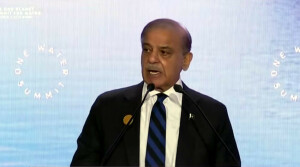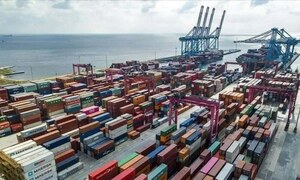‘High external funding risks’: Fitch maintains Pakistan’s rating at CCC
- Notes there are risks pertaining to policy implementation as parties across the political spectrum have extensive record of failing to implement or reversing reforms agreed with the IMF
Fitch Ratings, a US-based credit rating agency, has affirmed Pakistan’s Long-Term Foreign-Currency Issuer Default Rating (IDR) at ‘CCC’, read a statement on Wednesday.
“The ‘CCC’ rating reflects high external funding risks amid high medium-term financing requirements, despite some stabilisation and Pakistan’s strong performance on its current Stand-by Arrangement (SBA) with the International Monetary Fund (IMF),” said Fitch.

“We expect elections to take place as scheduled in February and a follow-up IMF programme to be negotiated quickly after the SBA finishes in March 2024, but there is still the risk of delays and uncertainty around Pakistan’s ability to do this,” it said.
Fitch upgrades Pakistan to ‘CCC’ after IMF deal
Fitch highlighted that the elections could endanger the durability of recent reforms and leave room for renewed political volatility.
On the ongoing IMF programme, Fitch said it expects the IMF board approval of the recent staff-level agreement SLA to be unproblematic.
“The successful programme review reflects continued fiscal consolidation, energy price reforms in the face of a public backlash, and moves towards a more market-determined exchange rate regime,” said Fitch.
Fitch noted that there are risks pertaining to policy implementation as parties across the political spectrum in Pakistan have an extensive record of failing to implement or reversing reforms agreed with the IMF.
IMF ‘seeks assurances’ from Pakistan’s political parties on commitment to new SBA
“We see a risk that the current consensus within Pakistan on the measures necessary to ensure continued funding could dissipate quickly once economic and external conditions improve, although Pakistan now has fewer financing options than in the past.
“Any follow-up IMF programme would likely require Pakistan to undertake sweeping structural reforms in opposition to entrenched vested interests,” it said.
Fitch does not ‘expect large further devaluation of Pakistani rupee’: report
On the political front, Fitch expects general elections in the country to take place as scheduled in February, and to produce a coalition government along the lines of Shahbaz Sharif’s government.
“Former prime minister Imran Khan’s Pakistan Tehreek-e-Insaf party likely remains popular, but its electoral prospects may be limited by Khan’s imprisonment and the departure of senior leaders … nevertheless, further delays to elections or renewed political volatility cannot be excluded and would jeopardise IMF negotiations and external funding,” said the credit-rating agency.
It said that the government’s overall funding targets are quite ambitious.
“The authorities expect total gross new external financing of $18 billion in FY24, against nearly $9 billion in government debt maturities… At end-September, maturities in the remaining three-quarters of FY24 were just over $7 billion,” said Fitch.
It said that the government funding target, which includes $1.5 billion in Eurobond/sukuk issuance and $4.5 billion in commercial bank borrowing, will likely prove challenging.
On the external account, Fitch forecasted a current account deficit (CAD) of about $2 billion (below 1% of GDP) in FY24, in line with FY23.
It said that contractionary fiscal policies, lower commodity prices and limited FX availability have driven the sharp narrowing of Pakistan’s CAD from over $17 billion in FY22.
Moody’s downgrades Pakistan’s rating to Caa3, changes outlook to stable
Fitch said that Pakistan’s foreign exchange reserves have recovered but are still low.
“Pakistan’s FX reserves have recovered on inflows of new funding and limited CADs, and we expect further increases,” said Fitch.
However, it noted that the country’s fiscal deficits remain wide.
“We expect the consolidated general government (GG) fiscal deficit to narrow to 6.8% of GDP in FY24, from an estimated 7.8% in FY23, driven by an improvement in the primary balance to a surplus of 0.3% of GDP, from a primary deficit of 0.8% of GDP in FY23,” said Fitch.
Fitch said that Pakistan’s debt dynamics are stable owing to high nominal growth over the medium term, with high inflation offsetting the pressure from high domestic interest costs.
“Nevertheless, debt/revenue (over 650%) and interest/revenue (about 60%) are far worse than that of peers, largely due to very low revenue/GDP,” it said.






















Comments
Comments are closed.